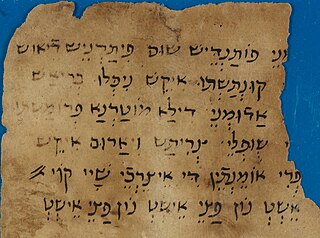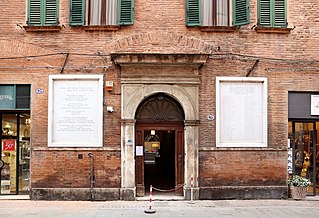In the 20th century, approximately 900,000 Jews migrated, fled, or were expelled from Muslim-majority countries throughout Africa and Asia. Primarily a consequence of the 1948 Arab–Israeli War, the mass movement mainly transpired from 1948 to the early 1970s, with one final exodus of Iranian Jews occurring shortly after the Islamic Revolution in 1979–1980. An estimated 650,000 (72%) of these Jews resettled in Israel.

Maghrebi Jews or North African Jews, are a Jewish diaspora group with a long history in the Maghreb region of North Africa, which includes present-day Morocco, Algeria, Tunisia, and Libya. These communities were established long before the Arab conquest, and continued to develop under Muslim rule during the Middle Ages. Maghrebi Jews represent the second-largest Jewish diaspora group, with their descendants forming a major part of the global Jewish population.

Mizrahi Jews, also known as Mizrahim (מִזְרָחִים) or Mizrachi (מִזְרָחִי) and alternatively referred to as Oriental Jews or Edot HaMizrach, are terms used in Israeli discourse to refer to a grouping of Jewish communities that lived in the Muslim world. Mizrahi is a political sociological term that was coined with the creation of the State of Israel. It translates as "Easterner" in Hebrew.
Jewish ethnic divisions refer to many distinctive communities within the world's Jewish population. Although considered a self-identifying ethnicity, there are distinct ethnic subdivisions among Jews, most of which are primarily the result of geographic branching from an originating Israelite population, mixing with local communities, and subsequent independent evolutions.

Judeo-Latin is the use by Jews of the Hebrew alphabet to write Latin. The term was coined by Cecil Roth to describe a small corpus of texts from the Middle Ages. In the Middle Ages, there was no Judeo-Latin in the sense of "an ethnodialect used by Jews on a regular basis to communicate among themselves", and the existence of such a Jewish language under the Roman Empire is pure conjecture.
Italian Jews or Roman Jews can be used in a broad sense to mean all Jews living in or with roots in Italy, or, in a narrower sense, to mean the Italkim, an ancient community living in Italy since the Ancient Roman era, who use the Italian liturgy as distinct from those Jewish communities in Italy dating from medieval or modern times who use the Sephardic liturgy or the Nusach Ashkenaz.
Mario Liverani, is an Italian historian and Professor of Ancient Near East History at the University of Rome La Sapienza. He is a member of many institutions, such as the American Oriental Society, Accademia delle Scienze di Torino, and doctor Honoris Causa of the University of Copenhagen and the Autonomous University of Madrid.
Jews Indigenous to the Middle East and North Africa (JIMENA) is a non-profit organization headquartered in San Francisco, California that is dedicated to the preservation of Mizrahi and Sephardi culture and history, and seeks to educate the public and advocate for Jewish refugees from the Middle East.

Fiamma Nirenstein is an Italian-Israeli journalist, author and politician. In 2008 she was elected to the Italian Parliament for Silvio Berlusconi's The People of Freedom party and she served as Vice President of the Committee on Foreign Affairs of the Chamber of Deputies for the length of the legislature, ending in March 2013. On 26 May 2013 she immigrated to Israel. In 2015, Nirenstein was nominated by Israeli Prime Minister Benjamin Netanyahu as the future ambassador to Italy, but subsequently withdrew for what she stated were personal reasons. She is Senior Fellow of Jerusalem Center for Public Affairs (JCPA) and currently works there, at the Israeli-based think-tank of JPCA. She writes for the Italian right-wing daily Il Giornale and contributes articles in English to the Jewish News Syndicate. She is also on the Board of ISGAP and of the WJC.
Asher Salah is an Israeli historian. He is one of the leading specialists in the literature of the Italian Jews, and a translator of Hebrew literature. He has written extensively in cinema studies and contemporary Middle East politics working as a columnist for several Italian newspapers.

Ettore Ovazza was an Italian Jewish banker. He was an early financer of Benito Mussolini, whom he was a personal friend of, and a strong supporter of Italian fascism,. He founded the journal La nostra bandiera. Believing that his position would be restored after the war, Ovazza stayed on after the Germans occupied Italy. Together with his wife and children, shortly after the Fall of Fascism and Mussolini's government during World War II, he was killed near the Swiss border by SS troops in 1943.

Conditions worsened for the Jews of Libya after the passage of Italy's Manifesto of Race in 1938. Following the German intervention in 1941, some Jews were sent to camps in continental Europe, where those who survived stayed until the end of World War II.
Henry Alan Green is a Professor of Religious Studies at the University of Miami, and has taught there since 1984. After completing postgraduate work at the Hebrew University of Jerusalem, the University of Oxford, and the Sorbonne, he received his Ph.D. in Religion from St. Andrew's University in 1982. He is the published author or co-author of four books and numerous articles, and has received recognition for his work on documenting the exodus of Jews from Arab countries after the Second World War.
Giovanni Garbini was an Italian Orientalist and Semitist. His biblical studies revealed historical omissions and helped scholars to interpret the biblical narrative in the larger context of the history of the ancient Near East. He worked as a university lecturer in the Istituto Universitario Orientale in Naples, at the Scuola Normale in Pisa and finally in Sapienza in Rome until his retirement. He was a member of the Lincean Academy since 1990, and a member of the Leone Caetani foundation for Islamic studies.
Moses Vita Ascarelli, also known by the pen name Emet le-Ya'akov, was an Italian physician, rabbi, writer, poet, and translator.
Simonetta Bernardi was an Italian historian and academic. She taught at the Sapienza University of Rome and at Roma Tre University.
In June 1967, an anti-Jewish pogrom took place in the Libyan city of Tripoli.

Gino Luzzatto, born on January 9, 1878, in Padua and deceased on March 30, 1964, in Venice, was an Italian economic historian. He initially worked as a teacher in southern Italy before joining an economic institute in Trieste and later relocated to the University of Venice in 1922, where he eventually became a rector. Luzzatto became a member of the Socialist Party in 1906. However, with the rise of Mussolini's fascists, he faced challenges in publishing his work. He was imprisoned for several months in 1925, and despite his protests, he was compelled to retire in 1938 due to the establishment of Italian racial laws. Luzzatto was from a Jewish household. After the end of the war, he became rector again and led the institute until 1953.

The Ferrara Ghetto was established by an edict of Cardinal Cennini dated 23 August 1624, in one of the oldest areas of the city, a short distance from the Cathedral of San Giorgio (Ferrara) and the Castello Estense. It was permanently closed in 1859.








